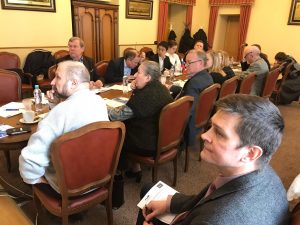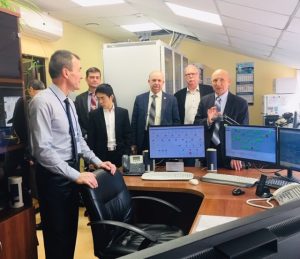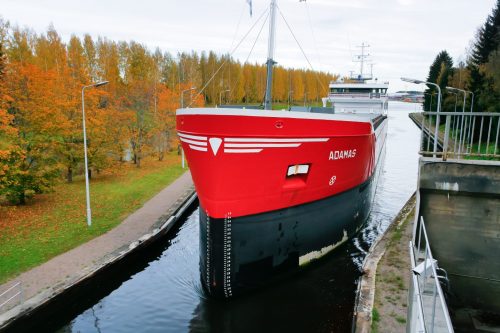INFUTURE held its 2nd working group meeting at Admiral Makarov State University for Maritime and Inland Shipping in St Petersburg on April 10, 2019. The main issues were to have a discussion related to project ongoing works and to continuation of those works in the near future. The working group meeting was attended by representatives of all Finnish and Russian partners and experts on inland waterway traffic. The project started perfectly. The first report named “Prosperous Future of Inland Waterways” had been published and can be found on Merikotka website at https://www.merikotka.fi/projects/infuture/?lang=en

On the second day, the INFUTURE group had an opportunity to visit the Volgo-Balt Administration in St Petersburg. The Deputy Head of Volgo-Balt Administration Mr. Gennady Iosifovich Aizen personally welcomed the delegation of Finnish representatives and the Russian participants of the INFUTURE project. He spoke about the role and importance of Volgo-Balt Administration, and cited the main data characterizing its activities in the region.
The next speaker, the leading specialist of the Basin Communications Centre Mr. Alexandr Anatolyevich Zhegalin, spoke about providing communications to navigators, the development of differential correction services and the prospects for implementation of river information services. The Deputy Head of the Cartographic Service Mr. Gleb Borisovich Chistyakov reported on the main tasks facing the cartographic service, on the modern technologies for creating paper and electronic navigation charts, on the operational aspects of providing cartographic products and proofreading data to ship-owners and captains, as well as on the introduction of digital technologies on the Volga-Baltic waterway.
The Finnish part of the project was presented by Ms. Tarja Javanainen (Merikotka) and Mr. Pekka Koskinen (Finnish Waterway Association). Their presentations were devoted both to the introduction of the project “The Future Potential of Inland Waterways” itself, as well as to the condition and development of ports and inland waterways in Finland and Sweden, and their role in the Baltic Sea region.
The project participants visited the Basin Communications Centre and the Ship Traffic Control Service, where the capabilities of the Volgo-Balt Administration in the operational monitoring of the entrusted waterways and fleet traffic control were demonstrated to them. The parties expressed a unanimous opinion about the need to attract young professionals and scientists to the work and activities under the project. The completion of the second day of work marked the successful completion of the second working meeting on the INFUTURE project.



